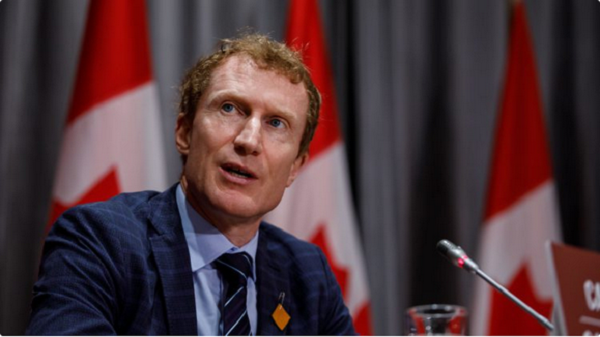Marc Miller addresses new 368 Canadian citizens from 60 countries, talks on international students, asylum seekers
It was a day after his constituency office was found vandalized, with windows smashed and pink paint sprayed over, but that didn’t stop Immigration Minister Marc Miller from cracking jokes with the audience at a special citizenship ceremony in Toronto to mark Cirque du Soleil’s 40th anniversary.
“Anyone want to change their mind? You still have time,” Miller said jokingly at Friday’s event. “But I’m pretty sure no one is going to change your mind if I look at the smiles on your faces. This is a beautiful time for you.”
Miller personally welcomed 368 new citizens from 60 countries as they took their oaths of allegiance to Canada under the big tent of one of the world’s most famous circuits.
Meeting proud immigrants who work hard to become Canadian and seeing the light in their eyes at events like this is a reminder for Miller of the value of Canadian citizenship — and the challenge the country faces today.
On the eve of his anniversary at the helm of the Immigration Department on July 26, the minister sat down with the Star to share the good, the bad and the ugly of this job in the past year, as well as what’s on his to-do list with the next federal election expected 15 months from now, in October 2025.
“Canadians are less tolerant of errors right now or of a system that lacks the rigour and discipline that it needs,” the Liberal minister said. “We’re not immune to social media and what people have seen in Europe, with large flow of irregular migration and the political systems that have leveraged that or weaponized that, and swept in typically right-wing governments.”
Miller said that on top of his mind is the rapid growth of refugee claimants in Canada since 2022, when international travel returned to normal after the pandemic.
The annual number of people who sought protection here was way above the pre-COVID level of 64,030 in 2019, reaching record 91,700 in 2022 and 143,580 in 2023. In the first five months of this year, already 77,725 claimants were reported. Some 186,000 claims are pending in the
Although most developed countries are also seeing a rise in asylum seekers as part of the growing global displacement, the minister believes this influx is what has contributed to the public perception that Canada has lost control of its border when they see refugees sleeping on the streets and staying in homeless shelters.
It’s important to bolster the integrity of the visa processing system, he said, given that many of the asylum seekers were temporary residents who came as visitors, students and workers.
“The system itself is undermined when we see flows that are coming in and not for the reasons that they were supposed to in the first place,” said Miller. “There are a number of measures that we are looking to take and will take, and hopefully announce in short order to further bolster that integrity, including in the international student area.”
He was frustrated that proposed reforms to streamline the refugee determination process were carved out from the recent federal budget bill under pressure by advocates. That means it will now take longer to push through those changes to address the refugee board’s unsustainable backlogs.
Two other issues are also on Miller’s priority list: Fixing the foreign worker program to crack down on fraud and passing legislative amendments to help Indigenous people travel seamlessly on their native lands across the Canada-U.S. border.
Miller said he’s working with Employment Minister Randy Boissonnault to make changes to the labour market impact assessment process to ensure only those employers faced with a real labour shortage are entitled to bring in foreign workers.
“LMIA fraud is a big concern,” he said. “You (workers) shouldn’t have to pay for it … These things do get shopped around and that’s not right. Enforcement is one aspect of it, but making sure that we disincentivize that in the first place is key, particularly where we see a constricting labour market.”
Miller was shuffled from his job as minister of Crown-Indigenous Relations to his current post amid rising borrowing rates and an affordability crisis that has seen the cost of housing and living spiralling — and changing public attitudes toward immigration and immigrants
.
Earlier this year, he surprised observers by introducing caps to rein in the number of international students and temporary residents as well as measures to restrict access to work permits, despite objections from the post-secondary education sector and employers. While he’s happy with the trending numbers he is seeing so far, he reminds Canadians that it takes time to see the impact.
Miller said it pained him to try to properly explain the affordability challenges faced by all Canadians when making these changes.
“We can’t blame immigrants for absolutely everything relating to affordability,” he said. “At the same time, the pure volume of temporary migration that we’ve seen in the last few years does contribute to the economic argument.
“We can’t have an unbridled backdoor entry system into Canada under the guise of an international student program that has seen exponential increases in its volume. So that does need to come under control.”
That “lack of discipline” of the immigration system is what Miller calls “the bad.” “The ugly” is the scapegoating that’s targeted new immigrants.
Poll after poll has shown Canadians’ support for immigration is declining, and Miller said he understands people’s frustration with an imperfect system. Yet, there are reasons to be hopeful.
“You have perhaps some people with undertones and frustrations, but you don’t have a major party that is running its campaign against immigration,” he pointed out. “I think that is important. At the same time, I don’t think we can discount the fact that there will be parties in the next election” that might do that.
Miller said he will continue to work on improving client experience and digitalizing the department, but is less certain about delivering the promised regularization plan that would grant permanent residence to hundreds of thousands of undocumented migrants toiling in Canada’s underground economy.
At best, he suggested, a smaller-scale plan may be possible for those in the construction and health-care sectors.
“Regularization, as I confess to you quite openly, has been a challenge we recognize, particularly in this political atmosphere, in the sense of where Canadians are,” he explained. “As ambitious as we are, with 15 months to go, we have to be realistic about what we can achieve.”
Miller, 51, has been an MP since 2015, representing a Montreal riding. He said being the immigration minister is a “difficult” job but he enjoys the work challenge, and said he’s planning to run in the next election.
When asked to confirm the rumour that he was not happy to take up the immigration minister’s job, Miller said that wasn’t true but he would have liked to finish “the unfinished job” at Indigenous Relations.
This article was first reported by The Star













